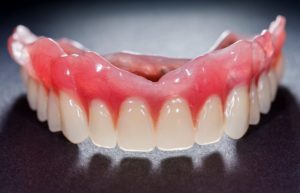
Investing in dentures to replace several or all missing teeth across an arch is a big step towards improving your health and quality of life. That’s because living with gaps in your smile has been shown to increase your chances of developing depression, social anxiety, and can even impact your ability to maintain a nutritional diet. Once you get your new replacement teeth, it’s important to take proper care of them to ensure they last as long as possible and continue serving you. Read on to find out four common bad habits that can impact your dentures so you can take the proper steps towards quitting them.
Sleeping with Your Dentures
Even though having a newly restored smile is an exciting life development, it’s important that you don’t sleep with your dentures, and you remove them before you go to bed. By doing this, you’ll be giving your gums and facial muscles a chance to rest and recuperate so they can support your restoration the next day. This will also keep them from drying out and changing shape, as you’ll store them in a glass of room temperature water while you’re asleep.
Nail Biting
Nail biting poses some of the same threats to your oral health with dentures as it does without. The bacteria from your hands can transfer to your mouth, leading to oral infections and the development of sores and cuts. It can also damage your replacement teeth by causing them to chip or break, leaving you to foot a hefty bill to replace or repair your prosthetic.
Wearing Your Dentures Irregularly
If you don’t wear your dentures every day, it could cause them to dry out, crack, and not fit properly within your mouth. If you aren’t wearing your prosthetic because you don’t like the way they fit, it’s a good idea to take them to your dentist to have them relined or assessed to ensure they’re properly secured over your gums.
Not Cleaning Them Daily
Just like your natural teeth, it’s crucial that you clean your dentures every day to remove plaque and food debris. If you don’t, that plaque could harden into tartar and turn your dentures into a bacterial breeding ground that can lead to the development of gum disease.
To clean your dentures, brush them using a soft-bristled or special denture cleaning toothbrush and cleaner. Be sure to place them on a non-slick surface after they’re cleaned to prevent them from accidentally sliding off of the bathroom counter and breaking, and thoroughly dry them.
By taking steps to break these four habits, you can increase the lifespan of your dentures and maintain their bright appearance and functionality. If you run into any issues along the way, know that your dentist can always help you address them!
About the Author
Dr. Maria Galvan is a periodontist, which means she specializes in the creation of prosthetics to restore smiles. She’s a Diplomat of the American Board of Periodontology as well as an Assistant Clinical Professor of Periodontics at UCLA’s dental school. As a specialist, she’s able to provide her patients with master-crafted dentures that look natural and are built to stand the test of time. She’s also highly skilled at repairing and relining prosthetics, as she has years of experience. To schedule a consultation, visit Blue Coast Dental Group’s website or call 310-424-3100.
